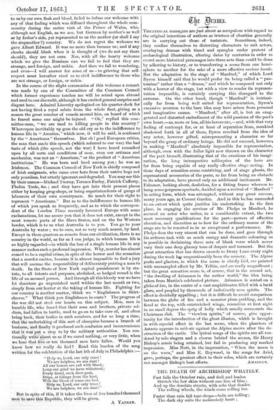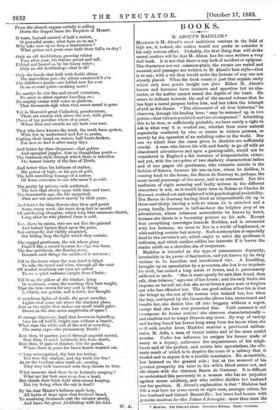THE DEATH OF ARCHBISHOP WHATELY.
Fast falls the October rain, and dull and leaden Stretch the low skies without one line of blue ; And up the desolate streets, with sobs that deaden The rolling wheels, the winds come rolling too.
Faster than rain fall tear-drops—bells are tolling ; The dark sky suits the melancholy heart ; From the church-organs awfully is rolling Down the draped fanes the Requiem of Mozart.
0 tears, beyond control of half a nation, 0 powerful music, what have ye to say ? Why take men up so deep a lamentation ? What prince and great man bath there fall'n to-day?
Only an old Archbishop, growing whiter Year after year, his stature proud and tall, Palsied and bowed as by his heavy mitre ; Only an old Archbishop—that is all!
Only the hands that held with feeble shiver The marvellous pen—by others outstretch'd o'er he children's heads—are folded now for ever In an eternal quiet—nothing more !
No martyr he o'er fire and sword victorious, No saint in silent rapture kneeling on ; No mighty orator with voice so glorious, That thousands sigh when that sweet sound is gone.
Yet in Heaven's great Cathedral, peradventure, There are crowns rich above the rest, with green Places of joy peculiar where they enter, Whose fires and swords no eye hath ever seen.
They who have known the truth, the truth have spoken, With few to understand and few to praise, Casting their bread on waters, half heart-broken, For men to find it after many days.
And better far than eloquence—that golden And spangled juggler, dear to thoughtless youth— The luminous style through which there is beholden Te honest beauty of the face of Truth.
And better than his loftiness of station, His power of logic, or his pen of gold, The half-unwilling homage of a nation Of fierce extremes to one who seem'd so cold.
The purity by private ends unblotted, The love that slowly came with time and tears, The honourable age, the life unspotted, That are not measured merely by their years.
And better far than flowers that blow and perish Some sunny week, the roots deep-laid in mould Of quickening thoughts, which long blue summers cherish, Long after he who planted them is cold.
Yea, there be saints, who are not like the painted And haloed figures fixed upon the pane, Not outwardly and visibly ensainted, But hiding deep the light which they contain.
The rugged gentleness, the wit whose glory Flash'd like a sword because its edge was keen, The fine antithesis, the flowing story, Beneath such things the sainthood is not seen ; Till in the hours when the wan hand is hfted To take the bread and wine, through all the mist Of mortal weariness our eyes are gifted To see a quiet radiance caught from Christ ; Till from the pillow of the thinker, lying In weakness, comes the teaching then best taught, That the true crown for any soul in dying Is Christ, not genius, and is faith, not thought.
0 wondrous lights of death, the great unveiler, Lights that come out above the shadowy place, Just as the night that makes our small world paler, Shows us the star-sown amplitudes of space !
O strange discovery, land that knows no bounding, Isles far off hail'd, bright seas without a breath, What time the white sail of the soul is rounding The misty cape—the promontory Death !
Rest then, 0 martyr, pass'd through anguish mortal, Rest then, 0 saint, sublimely free from doubt, Rest then, 0 patient thinker, o'er the portal, Where there is peace for brave hearts wearied out.
0 long unrecognized, thy love too loving, Too wise thy wisdom, and thy truth too free ! As on the teachers after truth are moving They may look backward with deep thanks to thee.
What measure shall there be to Ireland's weeping ? What are her best ones to so dear a head, But clouds their faint light after sunset keeping, But ivy living when the oak is dead?
By his dear Master's holiness made holy, All lights of hope upon that forehead broad, Ye mourning thousands quit the minster slowly, And leave the great Archbishop with his God. W. A.































 Previous page
Previous page